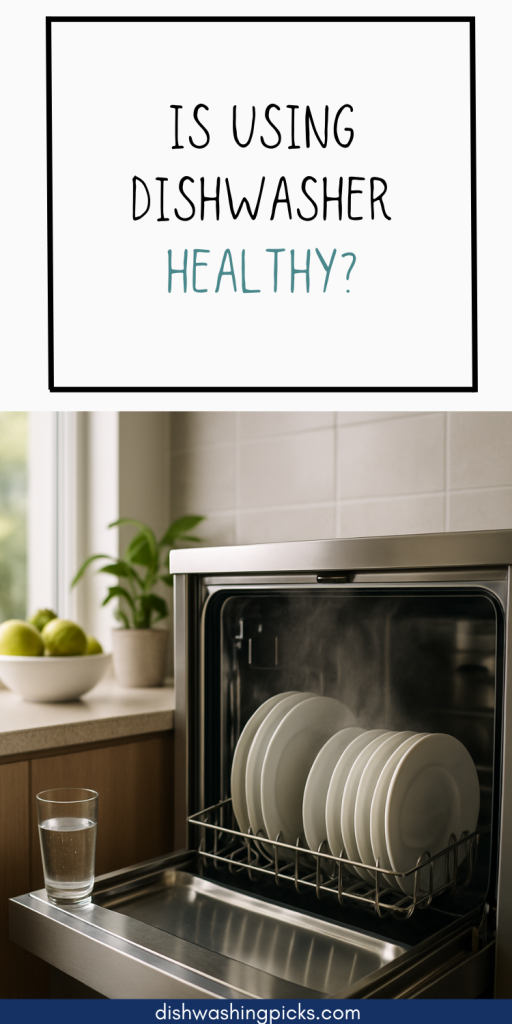
Wait… Can a Machine That Blasts Grimy Plates Be Healthy?
Okay, be honest—have you ever stood in your kitchen, looked at your dishwasher running, and thought:
“Is this really clean-clean? Like, safe-to-eat-off-of clean?”
You’re not alone.
For something that uses water, detergent, and a whole lot of heat, you’d think dishwashers would be an obvious win. But then someone says, “I only handwash—dishwashers spread germs!” and suddenly, you’re spiraling. Are those dinner plates secretly harboring a germ rave?
Let’s clear this up. We’re digging into the real science, common myths, and whether using your dishwasher is actually good for your health—or just convenient.
Spoiler: it’s more than just convenience.
How Dishwashers Actually Clean (And Why That’s Good News for Germaphobes)
Let’s nerd out for a second—but in the cool way.
Dishwashers don’t just splash water around like a lazy sink sprayer. They blast high-temperature water (often around 120–150°F or 49–65°C) through pressurized jets, combined with detergent that’s designed to break down food bits, grease, and bacteria. Some models even go full-on science lab mode with a sanitize cycle—that’s up to 160°F (or more), hot enough to kill serious germs.
Now try thinking of it this way: when you handwash dishes, you’re probably using warm-ish water and maybe a sponge that’s… seen better days. (Don’t worry, we all have that one sketchy sponge.)
So, in terms of health and hygiene, dishwashers often come out way ahead.
Bottom line?
Dishwashers don’t just clean—they sanitize. And if you use the sanitize cycle regularly, you’re basically serving your family food on near-sterile surfaces. Fancy, huh?
What About Bacteria? Do Dishwashers Harbor Germs Too?
Now here’s where people get spooked.
“But wait,” you say. “If it’s moist and warm in there, isn’t that, like, bacteria paradise?”
Fair question. And yeah—if you never clean your dishwasher, gunk can build up, and yes, some bacteria might chill out in the filters, seals, or corners. But that’s not a dishwasher problem—it’s a maintenance thing.
Quick fix:
- Wipe down the seals once a week.
- Clean the filter every month or two.
- Run a dishwasher cleaner (or just a vinegar + baking soda combo) every so often.
Boom—problem solved. It’s like brushing your teeth. You don’t stop using your mouth just because it needs cleaning, right?
Pro tip:
Using rinse aid also helps keep bacteria from sticking around and keeps your dishes drier—which means less moisture = less bacterial growth.
Does Dishwasher Detergent Leave Harmful Residue?
Ah yes, the “chemical” worry. Totally fair.
Here’s the truth: modern dishwasher detergents are formulated to break down fully during the rinse cycle. That’s the whole point. The final rinse (especially with today’s high-efficiency machines) uses clean water to flush out any leftover suds, so what’s left on your dishes is… well, pretty much nothing.
Still concerned? Go with eco-friendly or plant-based detergents. They’re often free of dyes, perfumes, and harsh additives, but still pack enough punch to clean.
So unless you’re licking your plates post-cycle (no judgment), the residue concern? Mostly a myth.
Hard Water, Soft Water… Does It Affect Health?
You might’ve heard that hard water in dishwashers leaves spots, builds up mineral deposits, and even messes with detergent performance.
But here’s the twist: those mineral spots aren’t harmful. They’re just… ugly.
If you’re in a hard water area, it’s a good idea to:
- Use a rinse aid
- Clean the machine regularly
- Maybe install a water softener if you’re fancy like that
But healthwise? You’re safe. No danger here—just aesthetic drama.
Is Handwashing Healthier Than Using a Dishwasher?
Ohhh, the great debate. Let’s settle this.
Handwashing can be thorough—if you’re using super-hot water (over 140°F), fresh sponges, and plenty of soap. But let’s be real—most people wash with lukewarm water and reuse sponges that… well… have seen too many spaghetti nights.
A 2009 NSF study even found that dishwashers kill way more bacteria than handwashing does, especially when using the sanitize cycle.
So unless you’re scrubbing like a surgeon with boiling water, dishwashers win this round for hygiene.
What About Allergies or Sensitivities?
If someone in your household has allergies, sensitive skin, or is immunocompromised, the dishwasher might actually be your best friend.
Why? Because:
- It gets rid of more allergens (like pollen or pet dander) that might cling to dishes.
- It kills mold spores better than air-drying.
- You can choose fragrance-free, sensitive-skin detergents easily.
So yes, dishwashers can actually help support a healthier environment in sensitive households.
The Unexpected Bonus: Mental Health & Less Stress
Okay, this one’s underrated—but think about it.
You had dinner. Everyone’s full. There’s a mountain of dishes.
Do you:
A) Spend 25 minutes scrubbing and drying everything?
B) Load it all in the dishwasher, press start, and go chill?
That small stress reduction? That moment of reclaiming your time? It adds up.
Less chore stress = better mental health. A clear sink and quiet machine humming in the background is basically kitchen therapy.
Conclusion: So… Is Using a Dishwasher Healthy?
Drumroll please…
✅ YES.
Dishwashers don’t just make life easier—they’re sanitary, efficient, and often healthier than handwashing.
They kill more germs, reduce allergen exposure, and keep your sponge from turning into a science experiment.
Imagine this: It’s the end of the day. You toss your dishes in, press a button, and boom—you’ve got cleaner plates and a cleaner conscience.
Just remember:
- Clean your machine now and then
- Use the sanitize cycle
- Choose the right detergent
Do that, and your dishwasher isn’t just a convenience—it’s a health upgrade.
